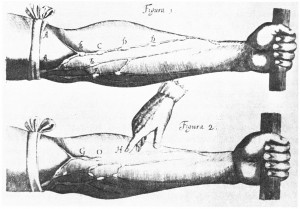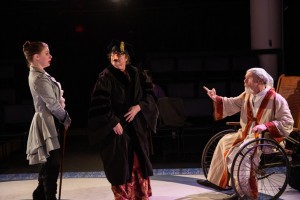
(Photo: Wikimedia Commons)
Molière seems truly modern despite having lived in France in the 1600s: His sharp satire was aimed at superstition and hypocrisy, attracting criticism from religious authorities and the entrenched nobility. Careful never to direct his satire against the monarchy, Molière was protected by the Duke of Orléans, who was the brother of King Louis XIV, and eventually by the “Sun King” himself.
The then-primitive state of medicine was a frequent target for Molière in several plays, accusing doctors of being little more than quacks spouting Latin and Greek terminology to hide their ignorance and impotence while doing more harm than good with enemas and purgatives. Molière gets quite a lot of mileage out of the refusal by doctors to accept new-fangled theories such as the circulation of blood, which had been discovered and published by William Harvey in 1628, 45 years before The Hypochondriac premiered in 1673. Molière likely knew a lot about bad doctors: He had tuberculosis for much of his life, and he suffered a severe coughing fit that induced a hemorrhage on stage, ironically, in the lead role of The Hypochondriac, after which he was able to finish that performance but died a few hours later at age 51. It is, as a result, the last play he wrote.
“Argan” (F. William Oakes) is a wealthy man in middle age who is convinced that he is gravely ill, being kept alive by “Dr. Purgon” (Ryan Leverone) who prescribes treatments, such as enemas and purgatives, that actually make him worse, and “Dr. Diafoirus” (Marilyn Busch) who is trying to marry her idiot son “Thomas” (Leverone) to Argan’s daughter “Angélique” (Gabrielle McCauley), a prospect attractive to Argan so he will have ready access to doctors in the family who will stop charging him outrageous fees. Diafoirus openly admits that she avoids patients “of rank” because, unlike common people, they can hold the doctor responsible for ineffective or harmful treatments and actually expect to be cured. Thomas, despite being an idiot, is about to become a doctor following in the family tradition. The plans of Argan and Diafoirus are obstructed by Angélique, who has fallen in love with and wants instead to marry “Cléante” (Mike Puppi). In this, Angélique is aided by the family housekeeper “Toinette” (Clare Blackmer) and Argan’s sister “Béralde” (Valerie Westgate). Argan’s wife and Angélique’s stepmother “Béline” (Lee Rush) is a gold-digger waiting for Argan to die so she can illegally inherit his estate with the help of corrupt notary “Bonnefoi” (Michael Thibeault), in the process consigning Angélique and her younger sister “Louison” (Kelly Robertson) to a convent. As the situation draws near to an explosive conclusion, we get to see apothecary “Fleurant” (Thibeault) – and his enema machine that nearly upstages the actors.
The translation from French and adaptation are jointly credited to director Wendy Overly, artistic director Jeff Church and “the ensemble.” It’s an excellent adaptation, using modern English rather than attempting a pseudo-Shakesperian tone although not totally escaping it. (Louis XIV ruled France for an unparalleled 72 years of stability and prosperity while England sank into religiously motivated civil warfare, and peace rather than war is more favorable to theater and other arts.) In my opinion, Burbage makes a wise artistic choice converting traditionally male roles (Diafoirus and Béralde) to female when played by female actors, even if obviously anachronistic to the time and place in which the play is set.
Oakes is very good in the title role, engaging in active and frenetic movements that belie his invalidity, even if his by far most energetic moments are those presaging episodes of diarrhea consequent to his habitual enemas. Centuries before the invention of the modern flush toilet, his graphic descriptions of his bowel movements – “Better get a shovel!” – inevitably portend Freudian significance. His problem is that he is not only perfectly healthy, but that his health is so good that even the repeated treatments by his quack doctors have been unable to kill him. Argan is, as Béralde says, never so happy as when he believes himself to be sick.

(Photo: Maggie Hall)
Blackmer as the housekeeper is the voice of reason, communicating by facial expression and body language what a mere servant is not permitted to say, and she has one outstanding scene playing a fake doctor. Westgate as the protagonist’s sister commands the necessary confrontational force to speak more than any other character for the playwright, arguing directly that the body is a machine that functions according to nature, and that medicine can advance only by systematic study of nature without complications of religion and authority. Busch and Leverone as the mother-son pair are hilarious, quite literally evoking a trainer and his puppy. McCauley and Puppi as the innamorati are at their best when playing out a supposedly improvised musical exchange in public. The very adult Robertson masterfully portrays a little girl about 12 years old, a remarkably convincing performance.
I use the term “innamorati” deliberately to note that Molière consistently drew from the traditions of “commedia dell’arte” and its stock characters, but broke enormously from and arguably subverted them to a purpose beyond mere entertainment. This play is full of that: much of Argan is “Pantalone” and much of Diafoirus is “Il Dottore” – and Burbage is certainly aware of this, even putting many of the characters on stage in masks at times. (Those masks may unnerve audience members who have a phobia about clowns, however.)
Burbage’s The Hypochondriac is hilariously funny, a modern take on a classic play by a classic playwright. As Jeff Church writes in his note from the artistic director, “But this play is not about the fools, the liars, the doctors, but about those of us who believe their lies at the expense of those nearest us…” Is he suggesting the enema as metaphor?
The Hypochondriac, written by Molière, directed by Wendy Overly, performed by Burbage Theatre Co, 249 Roosevelt Ave, Pawtucket. Run-time: two hours including one intermission. Through Dec 2. Handicap accessible. Cash bar available. Free off-street parking. Web: burbagetheatre.org/the-hypochondriac Tickets: app.arts-people.com/index.php?ticketing=burb Telephone: 401-484-0355; E-mail: info@burbagetheatre.org
More Posts by The Author:
Universal Basic Income and the Future of Work: Ominous Portents
News Analysis — Secret Police Records, Secret Arrests, Secret Charges: Brown University police make every effort to escape public scrutiny and accountability
Defending the Electoral College
Halloween 2024 Weather Forecast: Unusually warm but ideal for trick-or-treat
Cannabis Status: Update on expungements, taxes



